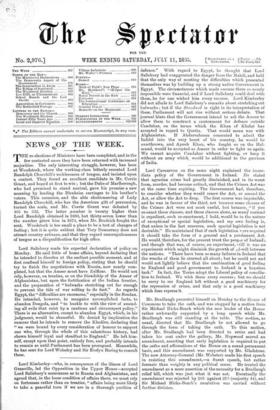Lord Carnarvon on the same night explained the imme- diate
policy of the Government in Ireland. He stated that agrarian crime had greatly diminished, and in its worst form, murder, had become extinct, and that the Crimes Act was at the same time expiring. The Government had, therefore, to consider whether they would renew the Act, or amend the Act, or allow the Act to drop. The first course was impelssible, and he was in favour of the third, not because some clauses of the Crimes Act were not most useful, but because, 'if you re-enact these clauses, and these clauses alone, as man/ contend is expedient, such re-enactment, I hold, would be in the nature of exceptional or special legislation, and my own feeling is, that unless in the last resource, such special legislation is not desirable." He maintained that if such legislation v,ere required it should take the form of a general and a pert6anent Act. He would, theiefore, for the present trust the peop.e of Ireland; and though that was, of course, an experiment, F till it was an experiment which might diminish the growth of id-will between the nations. "There have been so many failures in Ireland that the wrecks of them lie strewed all about ; but he could not and would not lightly believe that the combination of good feeling to England and good government to Ireland is a hopeless task." In fact, the Tories adopt the Liberal policy of concilia- tion to Ireland. We wish them every success ; but we should be sorry to see England left without a good machinery for the repression of crime, and that only is a good machinery which does repress it.


































